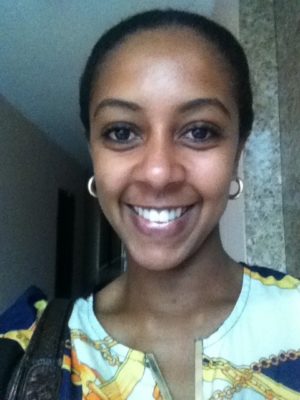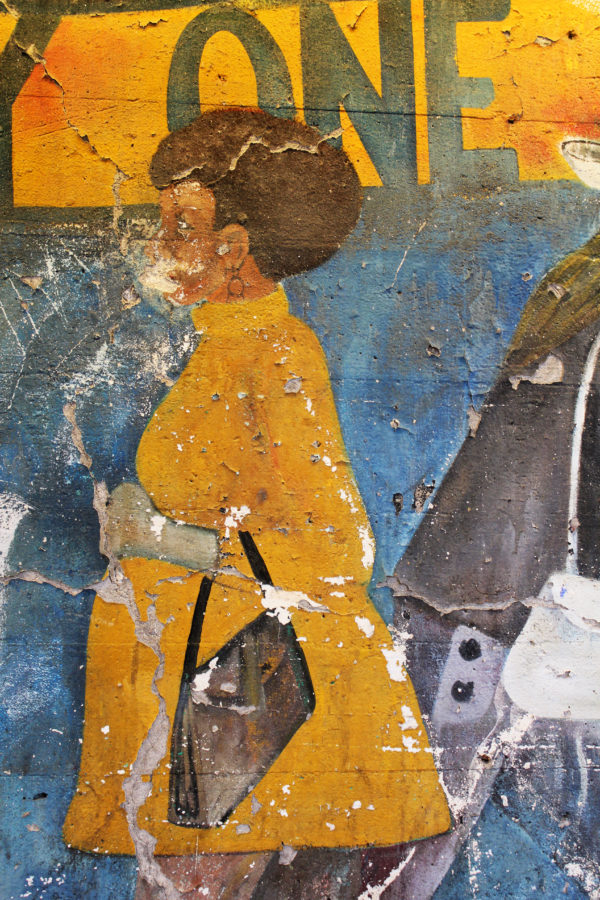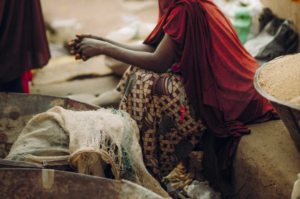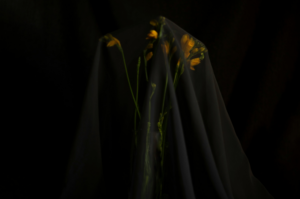NATURE WAS largely untouched in Hamusit—a large village in remote northern Ethiopia. It was thatch-roofed huts that sparsely dotted the open land. Technology or modern life was absent, in a way that made the people seem vulnerable, in a good way, and made the visitor from the city feel an instinctual envy.
Adanech was walking back the ten kilometers from the health post to her hovel, her feet covered in fine dust. Her youngest, one year and two months old, was slung in a pouch made from cowhide on her back, dead asleep from the monotone of his mother’s movement. But Adanech was the opposite of sleepy. The pregnancy fatigue that invaded her body had vanished and was replaced by a fountain of energy that came following a newly decided resolution. There was truth in everything Dimam the health extension worker told her that afternoon, and it had put more thump in her treads and more thrust in her journey.
Adanech unlatched the metal bolt on the fence made from eucalyptus trees and went in. The bolt was her husband Merigeta’s finishing touch to the weeklong construction of their house, which neighbors and relatives helped with and at the end of which Adanech had to throw a feast for all who took part. Merigeta had felt proud after installing it, the only factory-produced item on his hut.
Their four children were on their naked bottoms on the clearing by the hut, blended and hard to make out from the dusty ground. Merigeta was not there. He was probably leaning on a ragged large rock by a stream somewhere, with his friends, draping around himself and covering his mouth with the heavy gabi as he always did. He always said one had to be careful of brd—draft—the vague and ubiquitous Ethiopian disease, the current of cool air blamed for everything from kidney ailment to nerve illness, a stooped back and a misaligned jaw. Layering up to withstand oncoming draft was the way of the wise.
Her second youngest, three years old, followed Adanech into the hut as she descended on their low bedding, the mattress filled with straw, and worked over her shoulder to offload the baby. She put the child down to continue his sleep and then threw off her netela, the long white cotton shawl which once served as a cover from the headstrong sun and once as a waist wrap for the backbreaking chore of fetching water from the stream or milling grains on the stone grinder.
“Imama, tut!” her son requested from behind her, pointing to her breast with one hand and his other hand in his mouth.
She yelled, “Yelem!” and lingered on looking at him. He was standing small, his head half-shaved, and his body half-clothed; his belly bloated, from kwashiorkor. He had never been anything but the one-more-child that was too many.
“I told you no more tut.” She clutched her left breast. “It has dried!” she said, and walked him out when he began crying. She thought of Dimam, that sensible health extension worker, so young, yet so smart.
She heard the bolt on the door opening.
“What did you do to that child? ” Merigeta said entering through the hut’s low door, and waving his hat at Adanech, signaling her to leave the bedding. She got up and stood straight, facing him, with her hands on her waist, so that her traditional white cotton dress which the weaver handloomed from the yarn she herself spindled, hung in full length. Tall and well rounded, she was a match to Merigeta’s stature.
Merigeta glanced up at his wife. “What are you doing standing with your feet apart like a man?” he said, and then, “Go bring some Talla. My throat is cracking from thirst!”
“No, I cannot get you Talla. I cannot get you Talla because I am pregnant, and I am tired,” Adanech said. “I am pregnant! Again!”
Merigeta stood up, staring at the phenomenon unfolding in his hut.
Adanech continued, “I want you to know it Merigeta. I’m not having any more children. After I give birth to this one.” She pointed to her fully protruding bump with fingers that had rounded from a lifetime of chores. “I am taking the birth control!”
“What did you just say?” He moved closer, clenching a fist around his staff with a curved top.
“Forty five days after delivering. I will go and take the birth control from the doctor at the health post,” Adanech said.
Everyone referred to the new health officer as ‘the doctor,’ the very mention of which carried with it a hefty weight of importance. Merigeta hated Dimam the doctor, although Dimam the woman was another story.
They stared at each other. Merigeta wanted to hit her. Only the great thud of a slap, or his thick wooden staff against her body would begin to redress this affront.
“God banish the Dimam out of her! She can say all she wants in her little bureau, but not in my house!”
“I won’t need to tell you. All she needs is me there at the health post,” she said. Merigeta had never seen this Adanech before. “What will you do?” she asked him.
“What will I do?” he said looking away with a smirk as if to say you must not know me. Some spit escaped with his words when he blurted, “I will sue you!”
Then from Adanech came the laughter that echoed and seemed to reach and wrap every hut in the village. Her children stopped what they were doing, and gathered at the doorway.
Merigeta felt a switch flash in his head. He raised his staff and swiped at Adanech, but it missed her as his maneuver foundered. She ran out of the hut as fast as she could with the child she was carrying.
THE village chairman had called a meeting for the following Sunday. After mass was over and the priest dismissed them with a May you leave in peace, Merigeta tried to go unnoticed.
To his annoyance, he heard Alemu his neighbor behind him. “Merigeta! Merigeta!”
Alemu was a peasant and also a priest. When he mentioned the meeting, Merigeta told him he didn’t want to go. He knew what the meeting was about and that Dimam would be lecturing.
“But Merigeta, you don’t go the other way when the government calls a meeting.” And Merigeta gave in.
People were slowly gathering outside the church, concentrating under the two trees although the sun was not yet strong. Merigeta and Alemu also joined from the back.
DIMAM was nervous. She felt like the first missionary in a land of heathens. But she had to talk about birth control, demonstrate the use of a condom, and tell the men to allow their wives to take the pill.
She had braided her hair the previous night, and worn jeans and a button-down cardigan, which jarringly contrasted with the rest of the women who were all wearing their own spinning and not one was in pants.
She sat on one of the three collapsible chairs behind a metal table next to the other health extension worker of the post, and the Kebele chairman. The chairman spoke to give what he was there to give—the government’s backing, because the people feared and trusted the government. Dimam scanned the people. She personally knew some of them; she was born and raised in Hamusit. It was only two years ago, when she finished at the high school two hours away, that she left for training as a health extension worker in Addis. The women were gathered on the sides while the men settled on the front and middle.
The chairman introduced Dimam and took his seat in the sun.
“As chairman said, we are gathered today to talk about something very useful. If you take the advice I’m going to give you today, you will be richer, healthier, happier and more prosperous than the families before you,” Dimam said, and saw that she had people at the peak of their interest. They were enthralled. “I am going to tell you about the benefits of family planning.”
The people listened with patience as she spoke about the benefits of long intervals between pregnancies, and having children only as many as they had the resources for.
When she explained the pill and the contraceptive shot, the people’s grip of attention loosened. Murmurs broke the silence. Some begged for silence and a chance for the lady to finish. But many of the people thought of her as a hopeless heretic, even pitied her.
When she took out a Coca Cola bottle on the table and said that she was about to demonstrate the use of the simplest form of contraception, half of the men got up to leave and those that remained sniggered.
Walking away from the meeting, Merigeta, Alemu and their friends talked about what they thought was the worst part.
“Trying to do God’s work for Him. Making a woman sterile with a needle,” Alemu said, “may He forgive them!” He pointed his forefinger heavenwards.
“At least we know what to call that. It’s supposed to be civilization,” one of the men said, “but what do you call a woman taking the plastic glove and playing with our body parts like that!”
Merigeta was also shaking his head in disbelief, in agreement with the men.
“She’s just looks,” another one said a little later, “just looks.”
Merigeta suppressed an involuntary smile. He too had glanced at Dimam, taking in the width of her hips and round fanny.
“They say angels pick their names for people. She’s like a perfectly ripe fruit that you pluck and throw in the mouth!”
THAT afternoon, Dimam went to visit Adanech. When Merigeta heard her loud greeting by way of knocking, he got up from where he was slumped on the bedding and quickly presented himself outside. Dimam was at the doorstep when he stepped outside dabbing his mouth with his disheveled gabi to clean any Talla there may be.
He told her Adanech was not home.
“She missed her last appointment. And she didn’t come to the meeting,” Dimam said.
He said Adanech had gone to stay with her mother because her due date was nearing.
“Move to her mother’s house before she gave birth?”
“She said it was better that way.”
“She should not give birth at home,” she said with a concerned face. “Will she go to the other health post?”
“With all the advice you’re giving her, I am sure she knows what to do!”
Then when Dimam turned to leave, Merigeta acted. “Dimam! Come in for a little while, will you? I had something to talk to you about.”
As soon as Dimam was inside the hut, a gabi was spread over her, caging her before hands gripped her entire upper body with what could have been argued was a violent attack. But it was an embrace, one that closed all doors to a rejection that could seriously injure the ego.
Dimam was intolerably annoyed at the wet confusion of things that was happening at her lips.
When Merigeta stuck his back to the mud wall and pulled Dimam to him, his hands grabbing her bottoms, she was lost in the speed of things. She cried, “Let me go, you shameless drunk!” and pushed at his chest.
She was shivering when she ran out and pedaled on her bicycle to the clinic.
TEN days after Adanech moved into her mother’s house, Merigeta received word that his wife was in labor. He asked Alemu’s wife to tend to his children and left with Alemu. They walked three hours on dirt byways that traversed the northern massifs among which they lived. When they arrived at Adanech’s mother’s aged and crooked hut, they were sweating under the heat of their gabis although it was past dinnertime—only no one was minding dinner. Adanech’s laborious grunts were heard from inside the hut where the traditional birth attendant knelt between her legs. Even after five children, Merigeta never got used to the anxiety of this moment. He, Alemu and Adanech’s father remained outside, which was dark except for the faint glimmer from a lamp on Adanech’s side.
Adanech’s grunts grew into howls, and the women surrounding her had to physically restrain her, although if they let her free, she wouldn’t know what to do. The birth attendant could see the head of the baby, and he or she–nobody knew yet–was slowly coming out, leaving its home for the world. Once the head had fully emerged, the birth attendant helped by gently pulling it. Adanech cried through the rest of the birth. Then completely quieted down.
While waiting for the birth of the placenta, literally the ‘strange child’ in the local parlance, the birth attendant washed the blood-covered girl child with water and wrapped her in a clean piece of cloth. But the placenta never came. The child cried out with a weak, polite voice and also quieted down. The women looked hard at the baby, and one of them went out to deliver the news to the father and the men.
“How about her, how is she?” Merigeta asked, and she told him they were still waiting. But from between Adanech’s legs, there was only blood and more blood. The birth attendant was nervous. She had seen too many die. Adanech became restless, again requiring restraint as the birth attendant pushed down on her uterus, whispering a prayer for it to contract and stop the bleeding, but more blood gushed, soaked the netela, and streamed down the cow dung-smoothed floor. Adanech whispered that she was feeling faint, and soon, she became unconscious, her hands limp and her head hanging freely to the side.
Some of the women started crying while others, trying to gain control of the situation, suggested taking Adanech to the health post although all knew the fear that she would probably not last the long journey. Unable to bear any longer, Merigeta jumped into the hut. He faced Adanech, but her eyes were shut. She was bleeding, and the women had sweaty stern faces. He quickly reached for his wife to carry her to the health center. The birth attendant stopped him. She was still trying, tugging at the umbilical cord so that the placenta was birthed and the bleeding stopped. But at the contact of her leg with Adanech’s feet, she felt the cold. She remembered the dying women’s feet, the many she held as blood left that part of the body for the brain.
In the following minutes ensued a disorganized discussion of whether to take Adanech to the health center. A stretcher was sourced from neighbors. Adanech was transferred on to the canvas, her thighs covered with a netela. But before they walked out through the narrow door carrying Adanech, the birth attendant declared, “She has rested.”
**********
Post image by Quinn Dombrowski via flickr.
About the Author:
 Linda Yohannes is an Ethiopian writer. Her short stories have appeared on jalada.org, afreada.com and BBC Radio 4. She is a graduate of Addis Ababa University in English literature and a winner of the 2012 Burt Award for African Literature. Linda lives in Addis Ababa.
Linda Yohannes is an Ethiopian writer. Her short stories have appeared on jalada.org, afreada.com and BBC Radio 4. She is a graduate of Addis Ababa University in English literature and a winner of the 2012 Burt Award for African Literature. Linda lives in Addis Ababa.










Jon Doe December 26, 2016 11:34
Chilling how similar Adanech situation is to some women in my country. Patriarchal Societies... Thank you for this piece